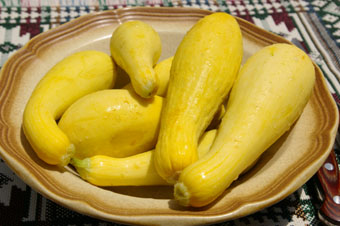
Squash:
Summer, Winter, Fall
By R. Alan Clanton, Thursday Review editor
Squash, and many vegetables that fall into the gourd group of foods, are one of those depends-on-the-time-of-year things—like tax returns or holiday cards. There are summer squash and winter squash, as well as varieties for spring and fall.
One thing that is certain is that squash—regardless of the seasonal variety—may be one of the healthiest foods a person can consume.
Among its many health benefits, squash is particularly high in folate (folic acid), fiber and beta carotene, making it—according to many medical researchers—one of the great cancer inhibitors. Some long term studies have shown that a moderate intake of squash (and this can include zucchini and most of the sub-categories of small gourds) have the profound benefit of reducing not only the risk of cancer, but also lowering the risk of heart disease. Squash is also beneficial to people with conditions of inflammation, such as asthma or arthritis.
And because it is loaded with vitamin C, squash is a great tool for warding off the more common ailments like colds and flu. According to the FDA and other sources we looked at, a single serving of squash contains almost one-third of the vitamin C needed in a single day, and nearly ten percent of the required potassium.
The fiber content alone is striking: recent studies indicate that people with a moderate-to-frequent intake of squash and zucchini may substantially lower their risk of internal cancers, such as colon and stomach cancer.
For this reason, squash is one of those time-tested super veggies—a disease inhibitor with zero fat, zero cholesterol, and high levels of potassium and calcium.
But it gets better. Squash is also a no-brainer in the kitchen. It requires no peeling, seeding or special preparation beyond one minute of thorough washing. Simply cut it to your preference of thickness. Sliced and boiled for a few minutes (and many people prefer to salt them lightly or season them with onions during the cooking) squash and zucchini make for one of the most convenient side dishes available. But, in about the same amount of time it takes to boil squash, you can just as easily steam it—with even tastier and healthier results. Skip the salt, and a single serving of squash slides onto your plate with only 1 mg of sodium and in less than five minutes.
The other advantage of steaming squash is that all varieties are rich in antioxidants; boiling may reduce these benefits, while steaming—especially for short durations—allows the vegetable to retain nearly all of its nutritional power.
So consider the health benefits and convenience of squash, zucchini and other small gourds the next time you are looking for veggie color on the plate.
Editor's note: this article appeared previously in Thursday Review, in summer 2013, and also appeared in the WOW!/Knology Health & Wellness Newsletter in the fall of 2012.
Related Thursday Review articles:
Bananas: Kings of Potassium; Maggie Nichols; Thursday Review; August 30, 2015.
Zucchini's Magical Qualities; Maggie Nichols; Thursday Review; June 19, 2014.
